‘I never imagined that something like this could ever happen again’: Holocaust survivors share their Oct. 7 experiences
Not all double-survivors believe it is appropriate to compare Oct. 7 to the Holocaust
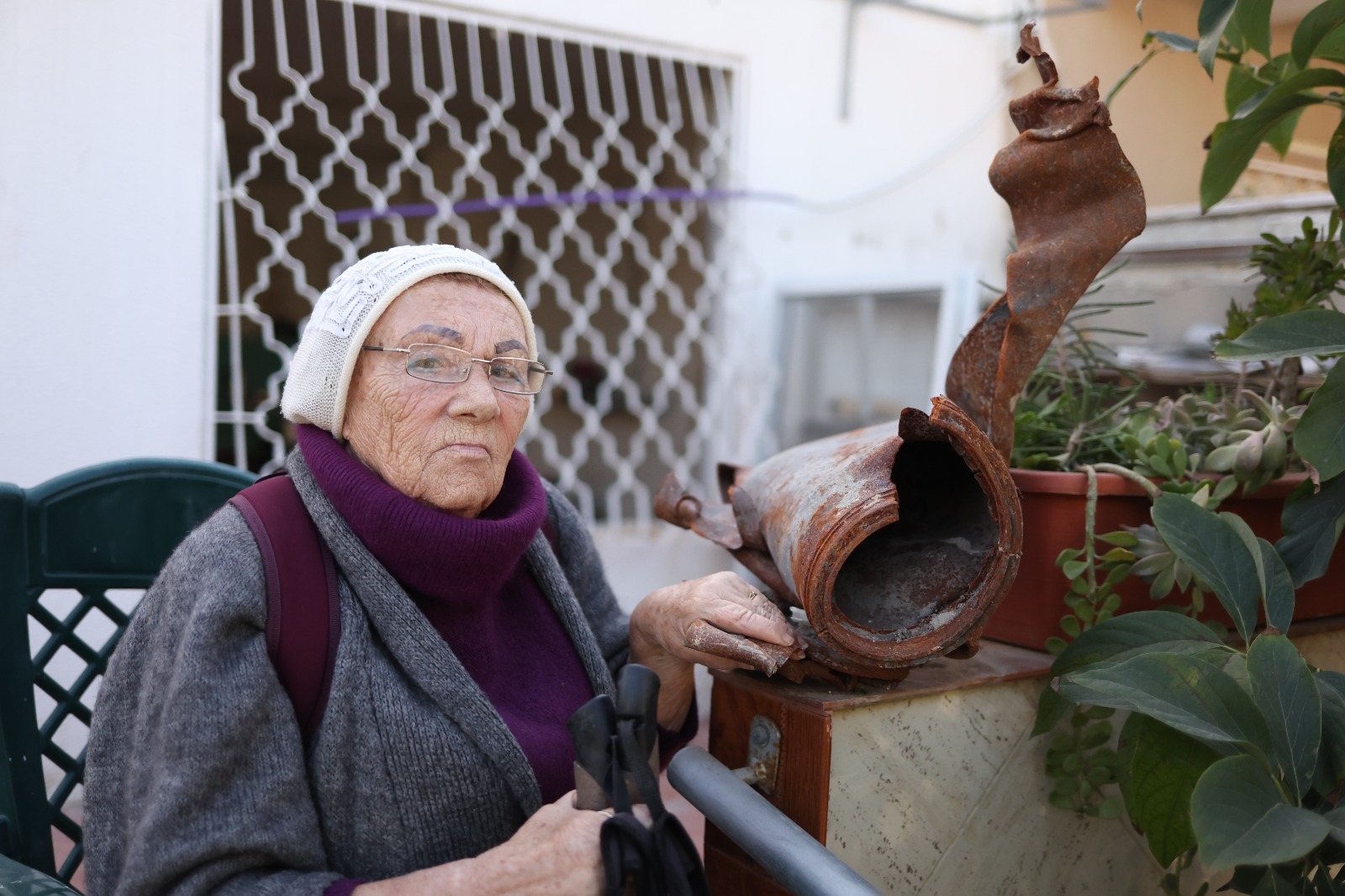
Mira Talalayevsky was 2 when her mother fled with her from the Nazis in Kyiv. On Oct. 8, 2023, a Hamas rocket destroyed her apartment in Ashkelon, Israel. (Photo by Mishel Amzallag, courtesy International Fellowship of Jews and Christians)
(JTA) — Eighty-four years after Dov Golebowicz fled Poland with his family days before Germany invaded, the Holocaust survivor found himself facing an invasion once again when Hamas terrorists stormed his kibbutz of Nirim on Oct. 7.
For 12 hours, Golebowicz was trapped with his son, Gideon, in his safe room. His son fashioned a basic wooden contraption to secure the door, which does not have a lock. Five people from the kibbutz were murdered and five were kidnapped, of whom two remain hostages in Gaza. Zvi Solow is another Holocaust survivor to survive the attack on Nirim.
In the weeks after Oct. 7, Golebowicz was the subject of multiple news reports, including CNN, which invariably linked his Oct. 7 survival to his experiences in the Holocaust. Others who experienced horrors on that day — when 1,200 Israelis were killed and about 250 taken hostage — made similar comparisons.
Yet Golebowicz has significant reservations about making such a connection, saying it diminishes the memory of the Holocaust as a singular event in history.
“I’ve always felt we shouldn’t mix the two,” he told the Jewish Telegraphic Agency. “While of course it was vicious, barbaric and horrendous, [Oct.7] was a one-day terrorist attack.”
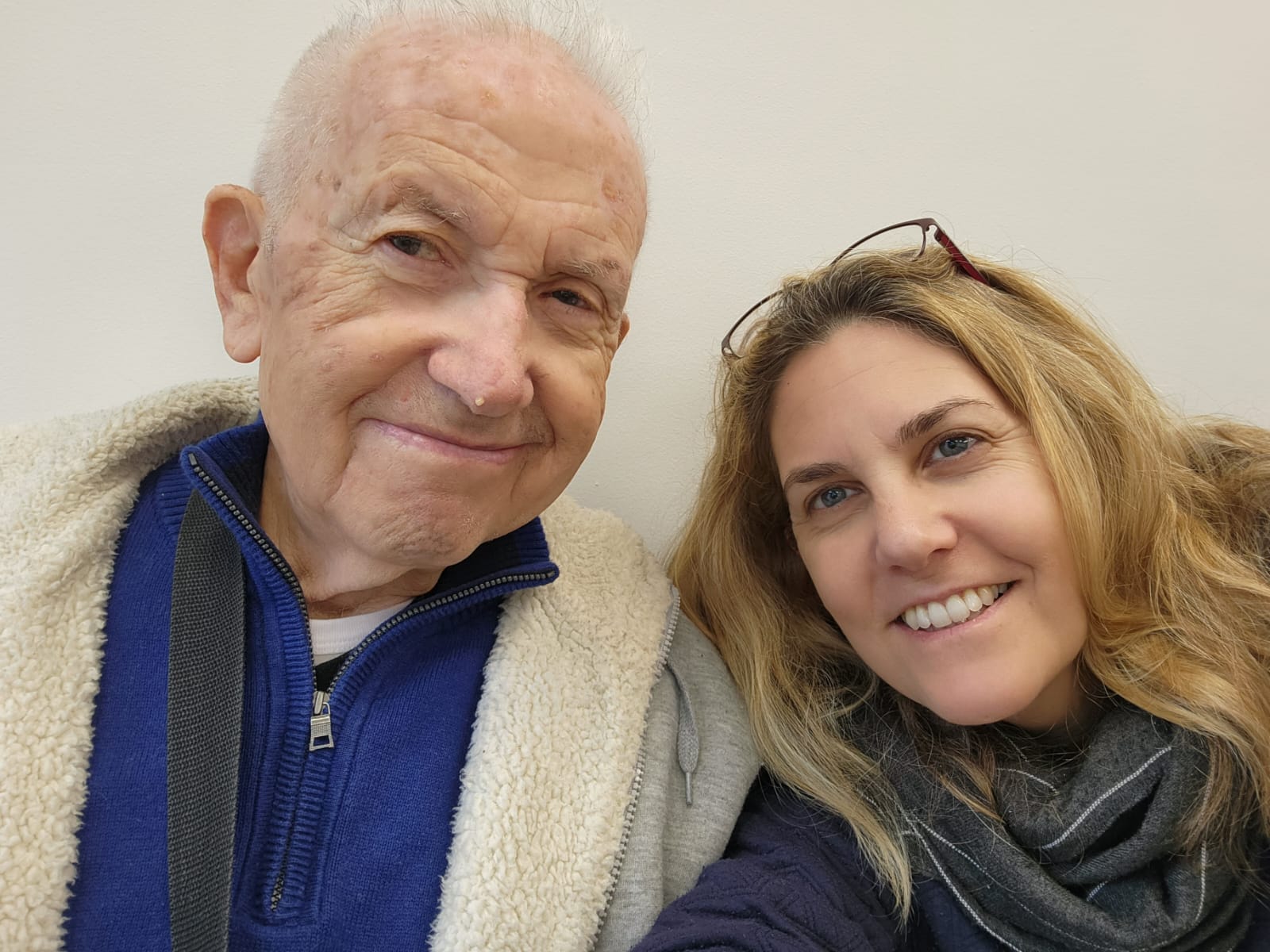
Dov Golebowicz, pictured here with his daughter, survived the Budapest Ghetto and the Oct. 7 Hamas attack on his kibbutz, Nirim. (Courtesy Golebowicz)
Golebowicz is one of several Holocaust survivors to be caught up in the carnage on Oct. 7. All elderly — the youngest survivors are in their late 70’s — they say they have an important perspective to share, though they don’t all believe the same things.
Haim Raanan, who as a child survived the Budapest Ghetto, has no reservations about calling the Oct. 7 massacre “a second Holocaust.”
A founder of Kibbutz Be’eri, one of the Gaza envelope communities that was struck hardest on Oct. 7, Raanan said it was “pure luck” that he and his family members survived. More than 100 Be’eri residents died that day.
“I never thought that as a Holocaust survivor, I would need to hide for my life again,” Raanan said at an event on Tuesday at the residence of EU Ambassador to Israel Dimiter Tzantchev to mark International Holocaust Remembrance Day.
“I was shocked to see that eight decades after the Holocaust, the Star of David symbol has been painted once again on Jewish homes all across Europe and the United States to target and frighten them amid the devastating Oct. 7 massacre,” he said, referring to graffiti found in some cities that in some cases authorities have attributed to Russian agitators.
“It echoes the antisemitic persecution I suffered as a child,” Raanan said. “I never imagined that something like this could ever happen again.”
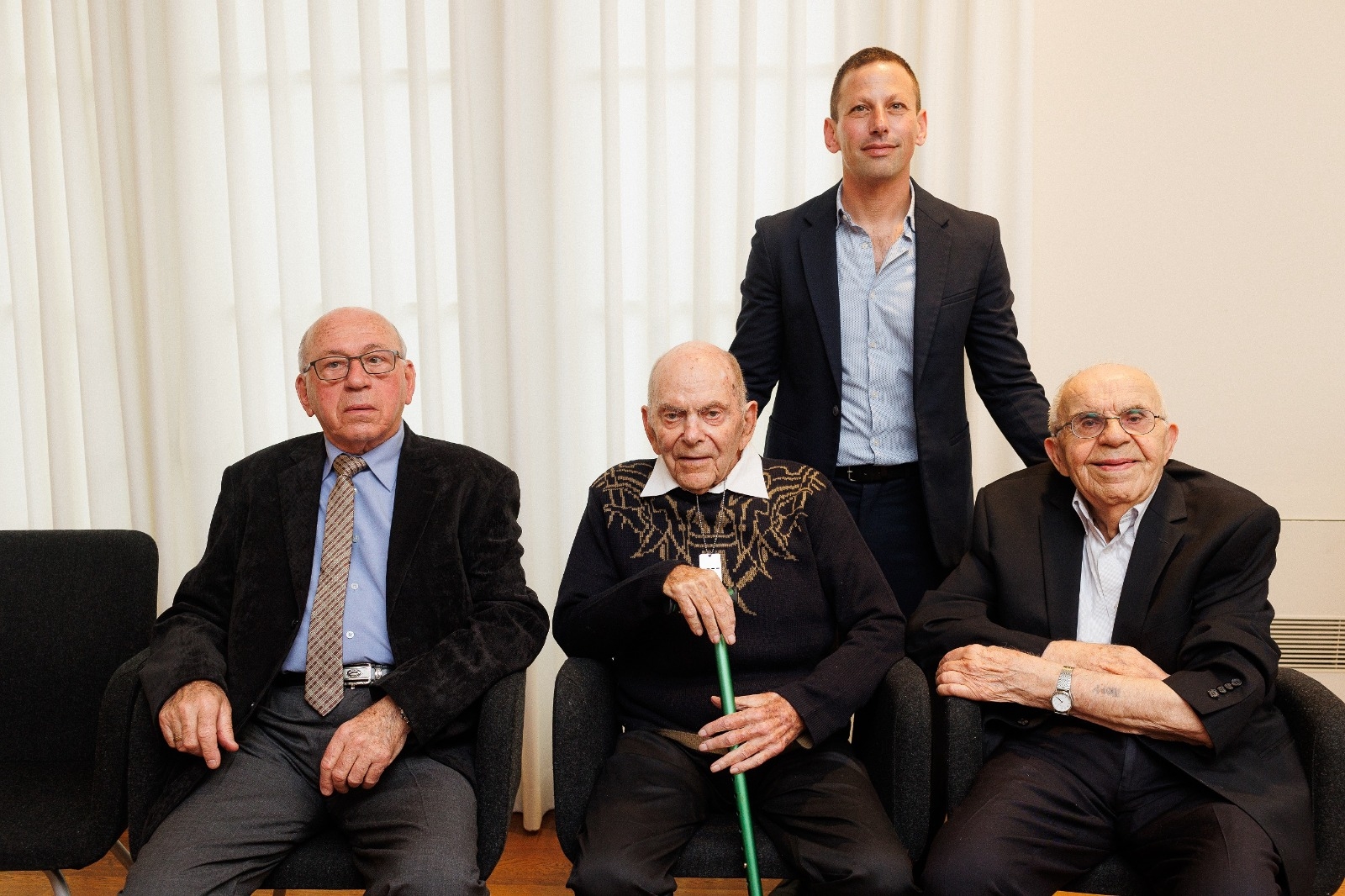
(L-R, sitting) Aharon Pacirkovsky, Haim Raanan and Menachem Haberman, all Holocaust survivors, pose with Erez Kaganovitz, photographer of the Humans of the Holocaust project, in Tel Aviv, Jan. 23, 2024. (Efi Yosefi)
Raanan called on the European diplomats in attendance to do more to combat antisemitism. The event also launched a new installation of the Humans of the Holocaust photo exhibition, in which Raanan features.
Erez Kaganovitz, the photographer behind the project, said attendees at the event were “awestruck” as Raanan recounted his stories of survival.
“How much suffering can one person go though in one in lifetime?” Kaganovitz told JTA. “Listening to him made me realize that when we say never again, it has to mean something.”
Holocaust survivor Gidon Lev, 88, shot to fame during COVID-19 when he became a star on TikTok. He launched his account, which racked up over 460,000 followers and millions of likes, together with his life partner Julie Gray in an effort to combat Holocaust disinformation and to promote his book. Three years later Lev closed the account, citing antisemitic harassment in the wake of Oct. 7 and the social media giant’s reluctance to take action.
“Before the war, we got antisemitic hate from garden-variety Nazis. Oh, how I long for those days. That was easy to refute and dispute,” Gray told JTA. But after Oct. 7, the “turning of the tide was abrupt and powerful,” she said.
“The same young people who had been following Gidon and cheering on his Holocaust education and messages of tolerance and critical thinking started calling him a supporter of genocide and even a ‘baby killer,’” Gray said.
“We both felt utterly defeated. We saw that many Jewish creators on TikTok stood up to this abuse and stuck it out but for us, living in Israel, dealing with the shock of all of it, and the sirens and the running to our shelter, it was too much,” she said. “It wasn’t the worst thing that happened, Oct. 7 was the worst thing that happened, but it really hurt. All the work we’d done seemed to have been meaningless.”
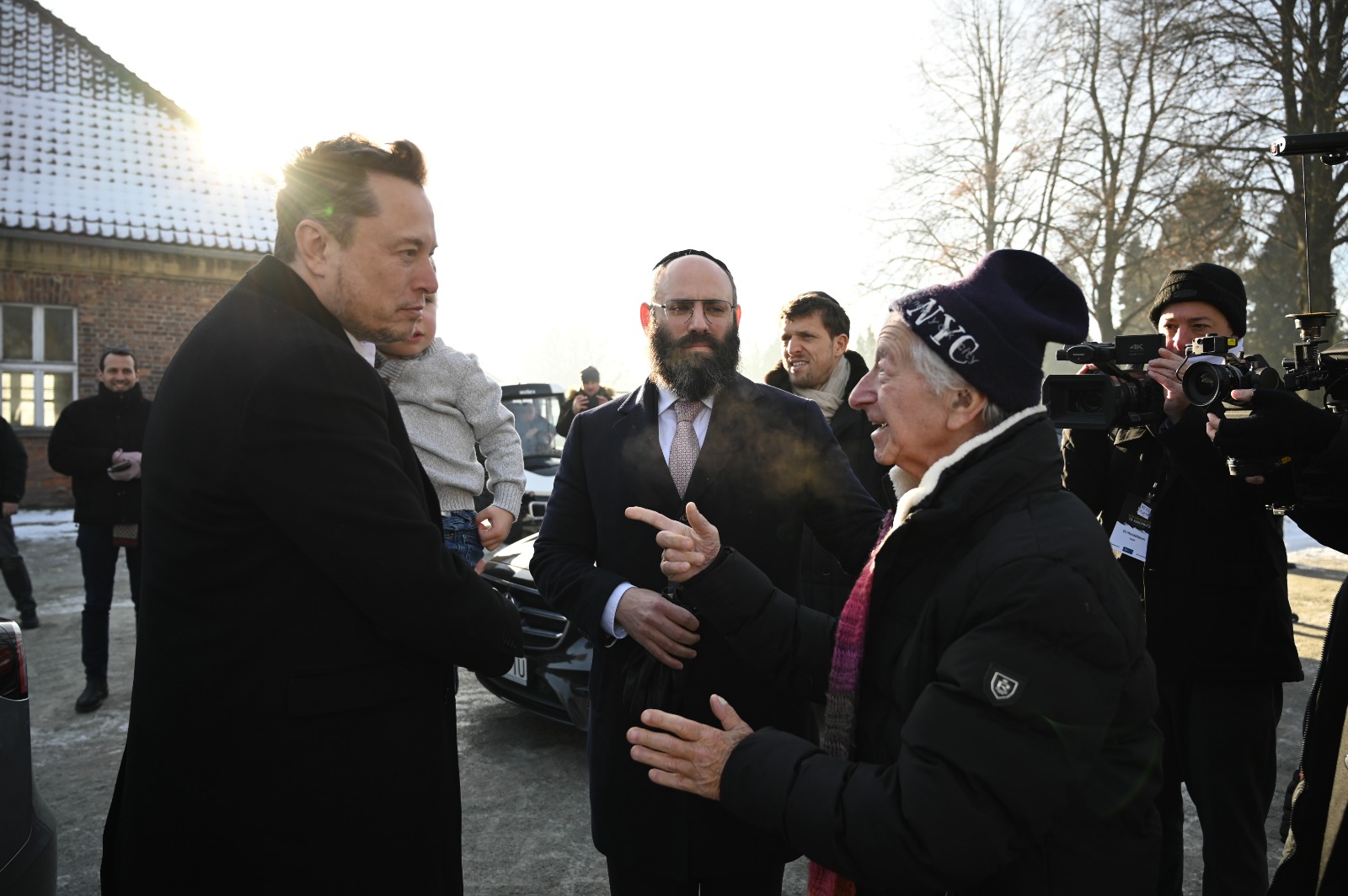
Elon Musk speaks with Holocaust survivor Gidon Levy at Auschwitz in Poland, Jan. 22, 2024. (Courtesy Julie Gray)
On Wednesday Lev and Gray returned from a trip to Poland, where he accompanied billionaire mogul Elon Musk and the conservative American pundit Ben Shapiro on a visit to the Auschwitz death camp.
After the visit Musk claimed that had social media been around during the time of the Holocaust, it would never have occurred. Like TikTok, Musk’s social media platform, X, has also come under fire for not doing enough to combat antisemitism.
Musk “struck me as a dangerous teenager,” Gray said, “drunk with power. He is of the ‘burn it all down’ ilk.” While he was attentive at Auschwitz, “greet[ing] Gidon politely and listen[ing] to him — sort of,” his talk afterward, in which he described himself as “aspirationally Jewish,” was a crushing disappointment and exposed a “real disconnect,” she said, adding, it was “like inviting an arsonist to a firefighting convention.”
After Oct. 7, Gray wanted to leave on one of the evacuation flights for American citizens. But Lev, whose son and grandson were serving in the reserves, insisted on staying. “I will not run again,” Lev told Gray.
The first time Mira Talalayevsky’s life was saved was on Sept. 29, 1941, when she was not yet 2 years old. Mira’s mother escaped with her from their home in the Kyiv ghetto the night before Jews were ordered on a death march to Babyn Yar.
The second time occurred on Oct. 8, 2023, when Talalayevsky’s home in Ashkelon received a direct hit from a Hamas rocket. Talalayevsky miraculously survived the rocket attack but sustained shrapnel cuts to her face and burns on her body from a fire that broke out in the house after the impact. Her house, and all her possessions, were completely destroyed.
“In my old age I am left with nothing and I have to start over,” Talalayevsky said.
Talalayevsky, 85, was too young to remember the night she was spirited away from the clutches of the Nazis, but said that over the years her mother had revealed every detail to her. When the Jews of Kyiv were rounded up to be transferred to the ghetto, Ukrainian guards were ordered to collect all their valuables. Her mother, an educated woman who knew German, was instructed to record every item that was taken.
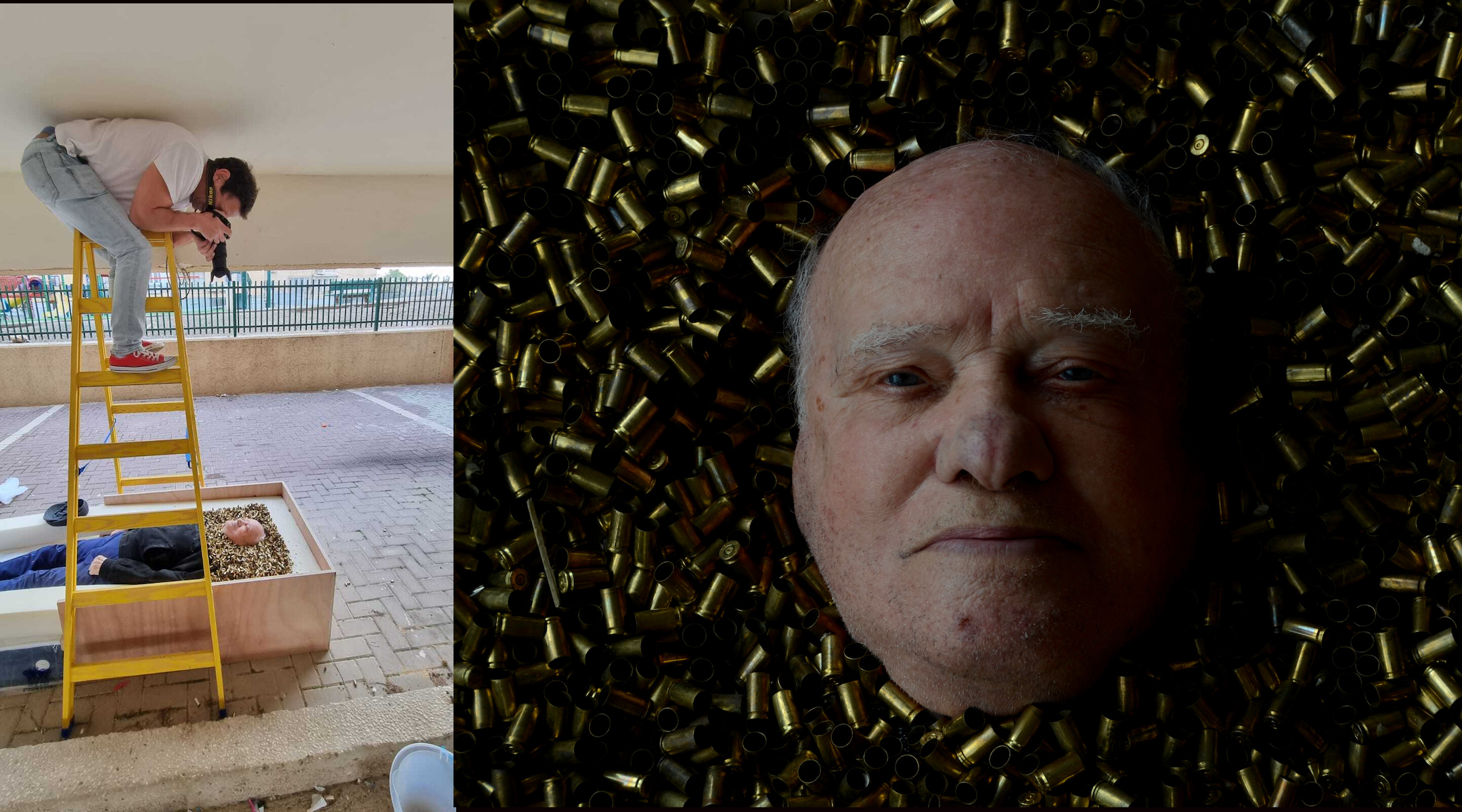
Left; Photographer Erez Kaganovitz at work on his Humans of the Holocaust project. (Courtesy of Erez Kaganovitz); Right: Portrait of Michael Sidko, the last survivor of the Babyn Yar massacre, surrounded by bullets. (Erez Kaganovitz)
Her mother built a rapport with a guard she had witnessed secretly pocketing some of jewelry for himself. The guard later warned her that the Germans were coming in the morning to kill everyone in the ghetto and that night helped Talalayevsky’s mother escape on a freight train. “I only remember the constant feeling of hunger and cold from those years. My childhood was taken from me, but at least I stayed alive,” Talalayevsky said.
Eighty-two years later, Talalayevsky climbed into her bathtub when she heard the rocket siren. It seemed like the safest place to be in her apartment, which was old and without a safe room. A violent explosion shattered her house and Talalayevsky lost consciousness. She was eventually rescued from the rubble by her neighbors. The event has left her with lasting nightmares and without eyebrows, she said.
Three months later, Talalayevsky is still waiting for her apartment to be rebuilt. In the meantime, the government has transferred her to a newer apartment in the city. Talalayevsky credits the International Fellowship of Christians and Jews with being the first organization to reach out after the attack, providing Talalayevsky with material and emotional support. “As a woman of faith, it is very moving to hear that there are many Christians in the United States who care for me.”
Golebowicz, too, is living in temporary accommodations — a retirement home near the coastal city of Netanya, together with some of the other evacuated residents of Nirim. He said he fully intends to go back and live in Nirim as soon as possible.
“I shall return to my home where I have lived for 70 years and help in its restoration,” he said. “All the destroyed kibbutzim will be rebuilt and will flourish again, because the determination and spirit in Israel is strong.”
This article originally appeared on JTA.org.
A message from our Publisher & CEO Rachel Fishman Feddersen

I hope you appreciated this article. Before you go, I’d like to ask you to please support the Forward’s award-winning, nonprofit journalism so that we can be prepared for whatever news 2025 brings.
At a time when other newsrooms are closing or cutting back, the Forward has removed its paywall and invested additional resources to report on the ground from Israel and around the U.S. on the impact of the war, rising antisemitism and polarized discourse.
Readers like you make it all possible. Support our work by becoming a Forward Member and connect with our journalism and your community.
— Rachel Fishman Feddersen, Publisher and CEO



















